Mauritania has been called slavery’s last stronghold. Now, a prominent anti-slavery activist has been released from prison and is running for president.
NOUAKCHOTT, Mauritania—
Essatim Mint M’Barka must have been about 15 years old when she became pregnant by her “daddy.” Not that he really was her father. But that’s what she called him because he was her master and she was his slave.
Just as her mother and her grandmother had been slaves their whole lives, the young woman’s future, and that of her unborn baby, was already mapped out. Sitting on the floor of her hut of planks and rags on the outskirts of the Mauritanian capital Nouakchott, M’Barka tells me her story, her face devoid of expression, as if paralyzed by her experience.
When she was five years old, an influential Arab-Berber family was looking for a little girl who could help with household tasks. M’Barka was taken from her mother, who lived as a slave with another family, to cook, sweep the floors and massage the feet of her new master.
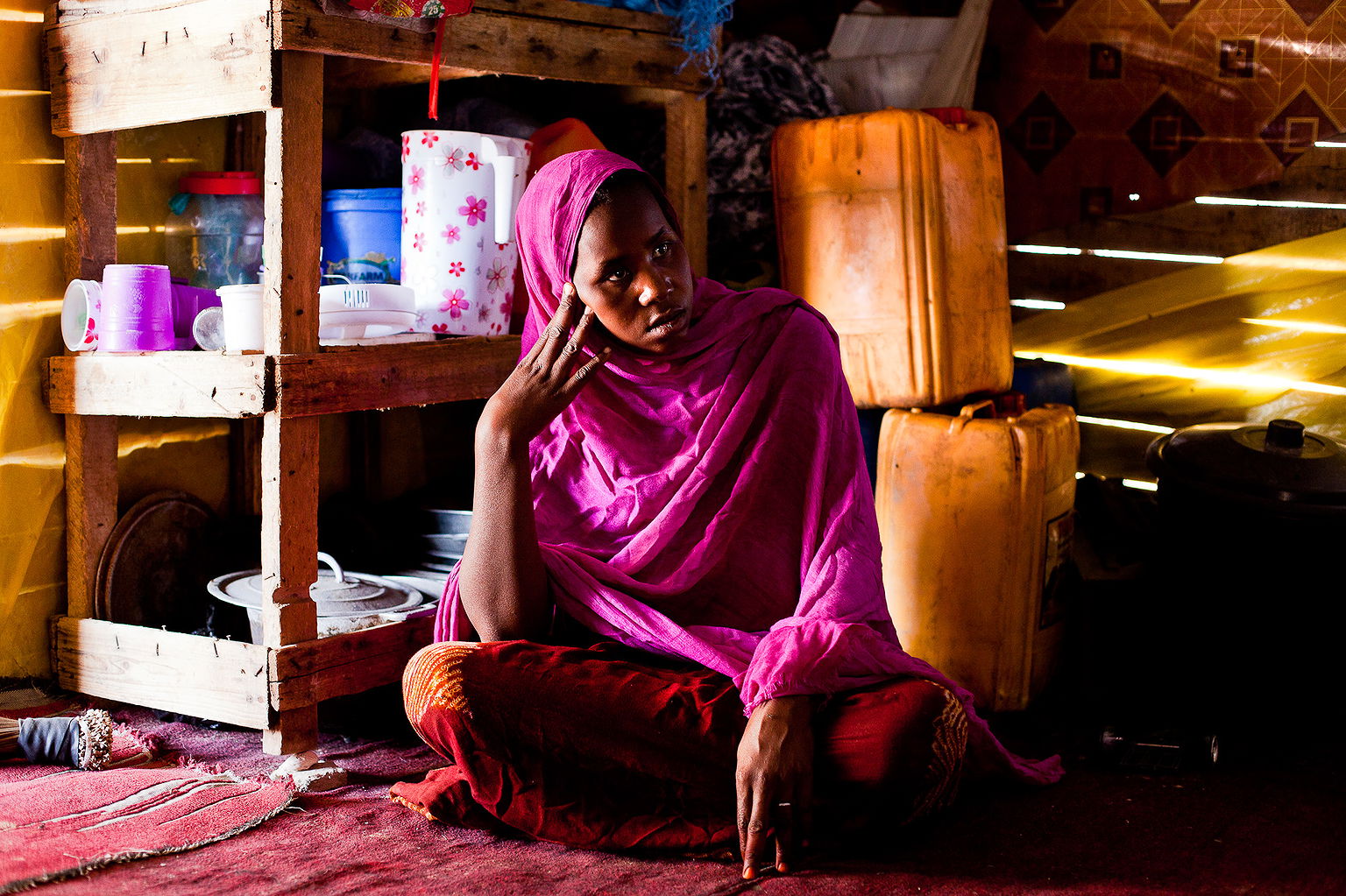
According to the Mauritanian government, though, M’Barka was never a slave. Officially, slavery does not exist in the northwestern African country. Mint Abdel Wedoud, chairman of the National Commission on Human Rights received us last year in a cold office. A portrait of President Mohamed Ould Abdel Aziz hung above her desk. The human rights organization has independent status but closely cooperates with the government.
“You have been in the country a week,” Wedoud told me. “Have you seen even one slave?” Before I could answer she decidedly said: “no, you have not seen any slaves. There are in fact no slaves here. In my whole life, I have never seen a slave. Nor have my children. Slavery is a historical phenomenon that we used to see. But that’s all in the past.”
Slavery has been abolished three times in Mauritania, in 1905 by the French colonizers, then in 1961 when it gained independence, and again in 1981—making it the last country to do so. But there was no legislation for criminalizing slavery until 2007. Since 2014, a slave owner risks a prison sentence of 10 to 20 years.
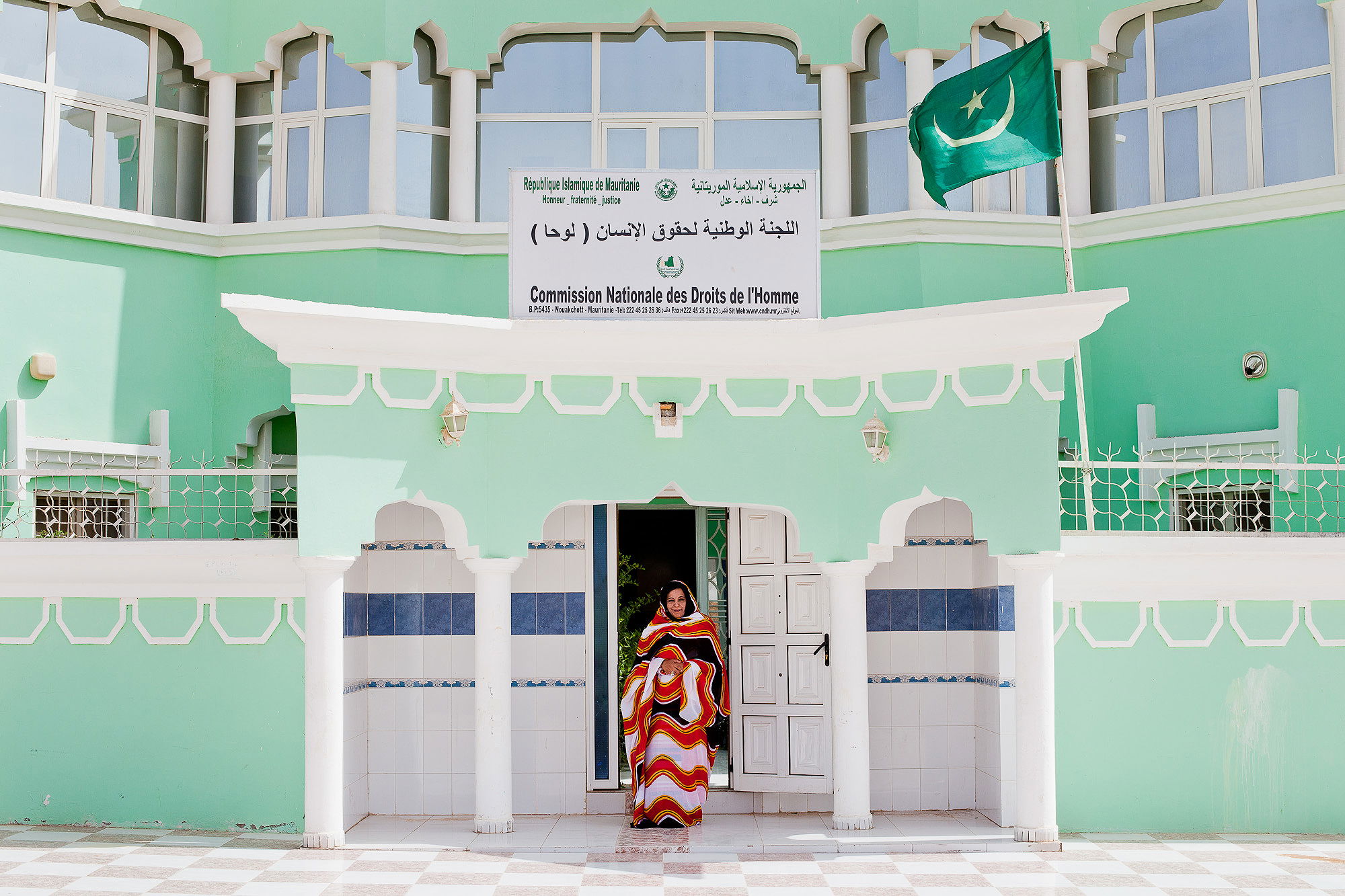
According to Mauritanian law, everyone is free. Wedoud sometimes receives cases of people claiming to be slaves. “Investigation usually shows that there is no slavery, but a historical bond that causes people to stay with their former masters, even if they are free.” That is the government’s official position. Slavery existed at one point, but not anymore. All that’s left is the aftermath: the remains of an old system. Wedoud’s colleague explained it by a metaphor: “It is like a goat that has been tied up its whole life. If you cut the rope, it just stands there.”
Yet several organizations place Mauritania at the top of the list of countries where slavery still exists. The Walk Free Foundation, an international organization that fights to end slavery, estimates that 43,000 people, or 1.06 percent of the total population, live in conditions of slavery. In 2014, the United Nations decided to send a special envoy to investigate the situation on the ground. In her report, Gulnara Shahinian confirms that slavery, in its traditional form, does still exist in Mauritania. Masters have complete control over their slave’s life, body and possessions. They can give them away, marry them off and make them work without pay.
But the fight against slavery has a face: that of the prominent activist Biram Dah Abeid. He is sometimes compared to Spartacus, the leader of the slave uprising against the Roman Republic, or to Malcolm X, but to many locals he is simply Biram, the man who goes on hunger strikes, frees slaves, and who once publicly burnt Islamic scriptures that he says justify slavery. In just a couple of years, Biram has split the country into two groups: those who love him and those who hate him.
I met Biram a year before my trip to Mauritania, in Brussels. Surrounded by three guards in a hotel room, he spoke slowly and thoughtfully, like a reverend. “I am always shocked when some Westerners try to tell me that slavery is part of our culture,” he told me. “They take a brutal crime, decriminalize it and turn it into a cultural phenomenon. There is no crime older than rape. Yet nobody will say it is a cultural thing.”
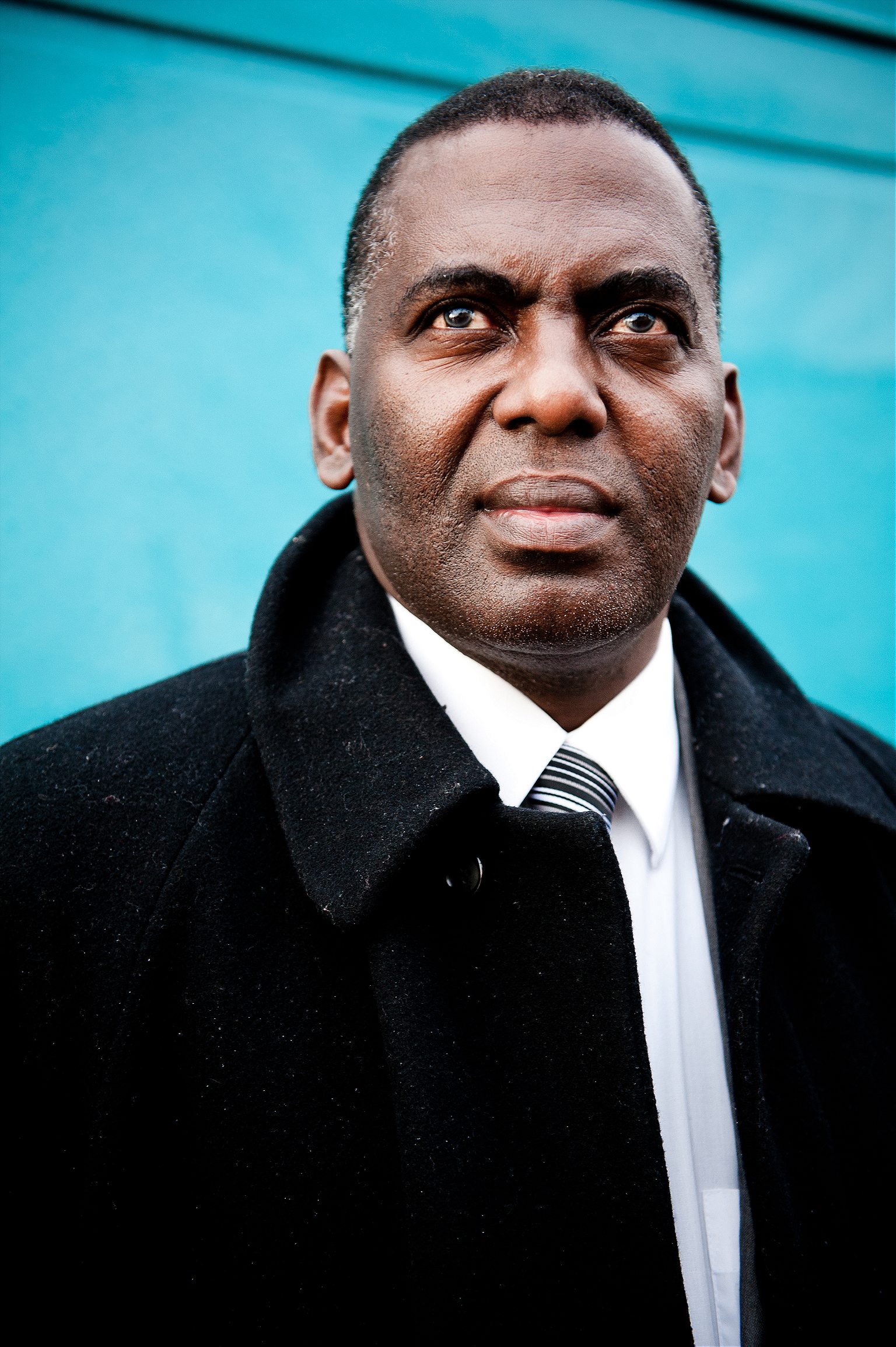
When Biram was eight years old, his father told him that his grandmother had been a slave. The revelation had a profound impact on him. “I promised my father that I was going to fight slavery and discrimination,” he told me. The young boy started to write pamphlets, which he handed out at school. Later, he went to study law in the capital Nouakchott and had an administrative job for 10 years until he was so frustrated with his superiors that he quit and became a full-time activist.
After being a member of the more diplomatic and state recognized anti-slavery organization SOS Esclaves for many years, he decided to create his own organization in 2008. The logo of L’Initiative pour la Résurgence du Mouvement Abolitionniste (IRA) is a red clenched fist. The powers that be deserve a punch, and Biram intends to throw one at them.
“The state has been complicit in slavery, so it is not in their interest to fight it. That is why slavery continues to exist,” he told me in Brussels. The UN also holds Mauritania’s government responsible, as it has failed to implement legislation and seems unwilling to follow up on allegations of slavery. Most cases are closed without proper investigations.
Biram’s blunt accusations and actions have received coverage in local and international press. He also travels all over the world to raise awareness about slavery and collect funds for his organization. In 2013, the UN awarded him its prestigious Human Rights Prize, which Nelson Mandela received in the past. A year later, he decided to run for president. But after losing to the incumbent president, Biram was sentenced to two years in prison in 2015 for membership of an unauthorized organization (his own IRA), participation in illegal assembly and disorderly conduct.
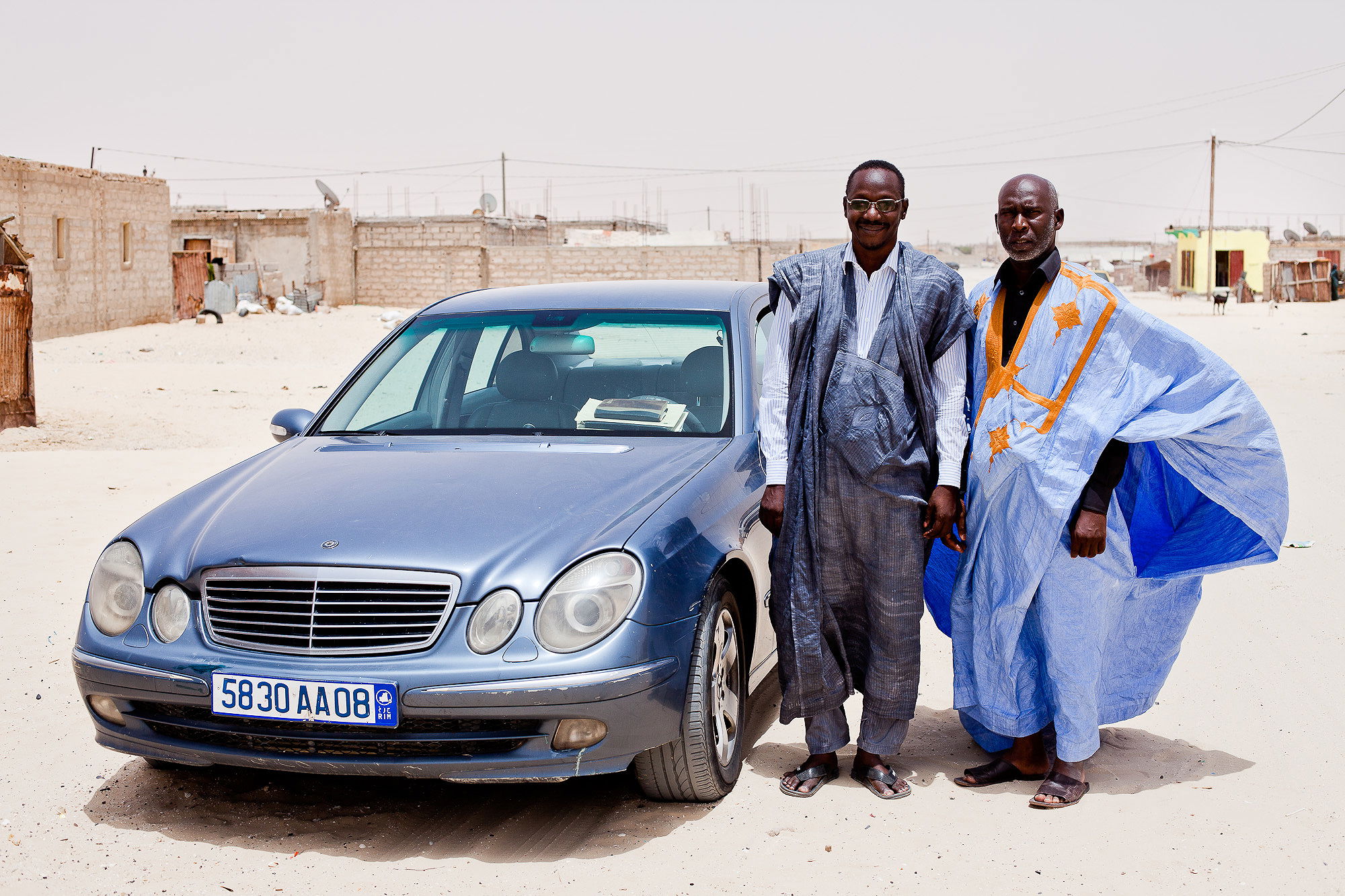
I visited Mauritania in April that year. On a Sunday morning, a silver-colored Mercedes stopped in front of our hotel in Nouakchott. Two men in shining traditional costumes got out. They moved slowly, formally, like high officials. Hamady Lehbouss acted as the interim leader of IRA while Biram was imprisoned. His colleague took care of the finances. They took me to meet two former slaves so I could hear their stories.
The further we traveled, the fewer houses appeared along the road. Eventually, the asphalt ended too. I met Moyna, who lived with a dozen family members in a wooden shanty in the middle of the desert. Under the canopy, swarms of flies hovered around a tray of damaged mangoes, her livelihood. It was barely enough to live on, but anything is better than her previous life, she said.
A former slave, she decided to flee after her master got her pregnant and killed the baby. “At that time, there was a bus from Rosso to Nouakchott every day,” she told me as we sat in the dark hut. “I had never taken a bus before. I had no money on me. I did not even know what money was for. But the bus driver let me get on. When we arrived in Nouakchott, the bus driver pulled me aside and whispered in my ear: When I saw you, I knew you were a slave, just as I used to be. I am glad I could help you.”
A few days later, I met Boubacar Messaoud, president of the anti-slavery organization SOS Esclaves. He lives in one of the better areas of the capital in a modern house that he designed himself. We sat in a traditional nomad tent at the back of the house, where the family drinks tea and watches television in the summer months.
“The American plantation owners dreamt of slaves like we have here,” he said. “You do not have to tie them up because normally they will not run away anyway. They are completely subordinate, shaped by an environment where slavery is deeply rooted in the norms and standards, in tradition, in religion.”
“A freed slave has to go through a difficult process,” Boubacar continued. “He has to liberate himself from the callous animal that slavery has transformed him into. He has to learn to think and act independently. He has to retrieve his personality, regain his dignity. Step-by-step, he will become human again.”
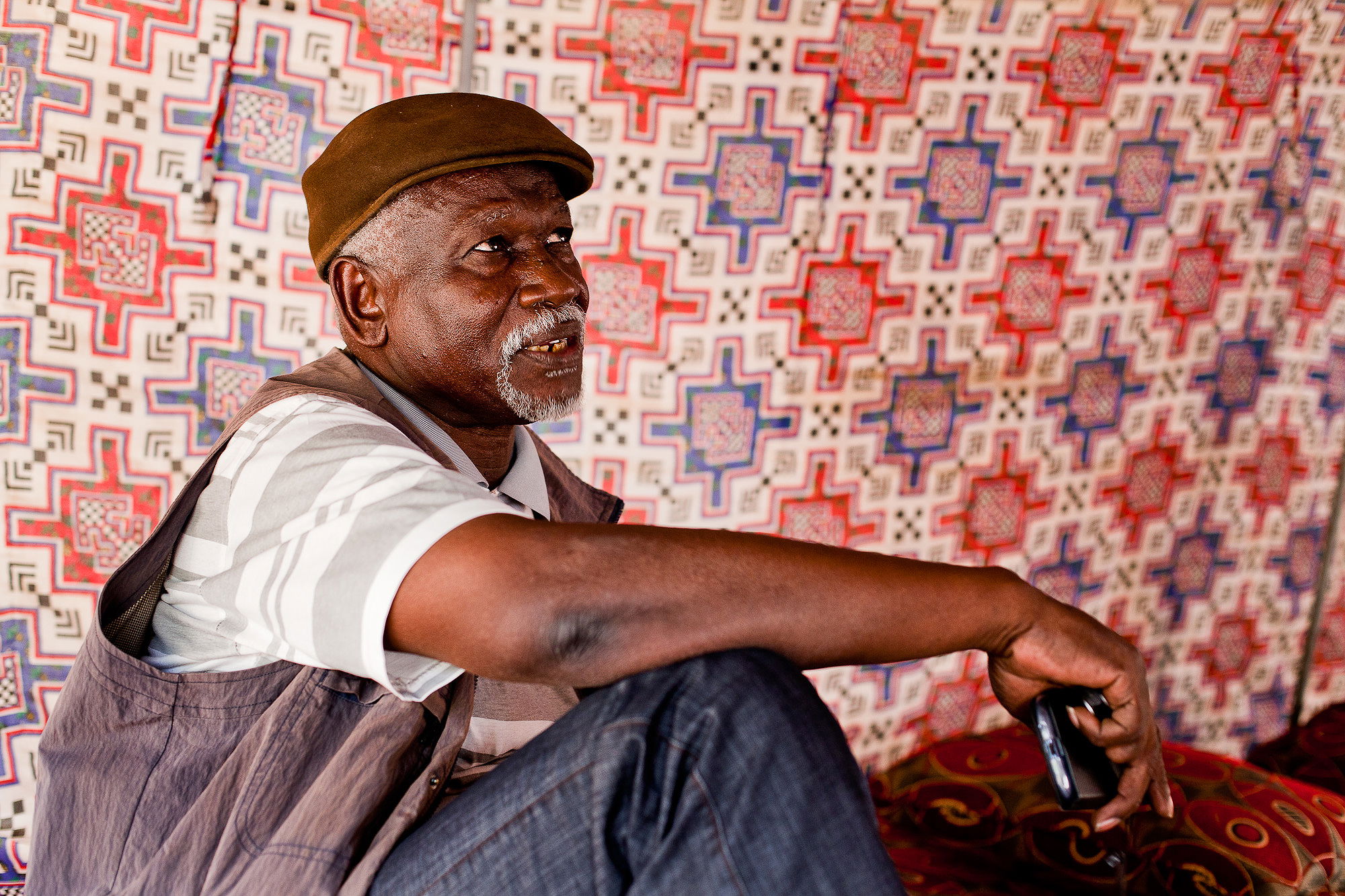
Organizations like SOS Esclaves and Biram’s IRA help slaves during this extensive process. Years can pass between the moment a slave becomes aware of his rights, runs away and files a complaint against his master. Some decide to back out when interrogated by the police. According to IRA, police officers have been known to intimidate victims because they know the slave masters.
Eventually, it’s up to the public prosecutor to decide whether to prosecute. The large majority of the cases are dropped, and only one master was sentenced to jail time, in 2011. But things might be changing. Two weeks ago, two slave owners, men from a highly influential and powerful family, were convicted on charges of owning two women as slaves from birth in the desert town of Néma. They were sentenced to five years in prison and fined one million ouguiya ($2,800).
The verdict was applauded all over the world. Gulnara Shahinian, the former UN special envoy who has visited Mauritania five times, said she considers the trial an important step forward. Africa Program Coordinator for Anti-Slavery International Sarah Mathewson was even more enthusiastic. “Lots of people will be very encouraged by this ruling—encouraged to leave slavery, encouraged to access justice,” she said in an interview with CNN. “And slave owners will be discouraged from continuing to abuse them. It’s unbelievable. It keeps dawning on me.”
But upon hearing the news in his jail cell, Biram said he was more skeptical. “If it sounds too good to be true, it probably is. I have seen this all before. It’s just another clever way for the Mauritanian president to throw dust in the eyes of the international community. We do not have independent judges in this country.” A day later though, Biram was freed from prison. Hundreds of supporters assembled in front of the court and marched to the prison to await his release.

I called Biram on Sunday evening, 12 days after his release. He still had the same persuasive voice as when I first met him more than two years ago. But he raises it more often now. It is the only effect 18 months in prison has had on him, he said. “It were not the judges who have decided to release me,” he said. “Neither did they decide to imprison me in the first place. In Mauritania, all the power is in the hands of one man, the head of state Abdel Aziz.”
According to Biram, the fight is far from over. His liberation might have given hope to people all over the world, but Biram himself sees no reason to celebrate. “Aziz failed because he underestimated our resistance. Both my resistance from within prison, and the resistance of our partisans and the international community outside. When he realized he could not win the battle, he got scared and withdrew. He just had to find a way to retreat honorably, so he ordered his judges to set me free.”
As long as Aziz is in power, Biram will never support the government’s measures to eradicate slavery. He will never believe their promises, nor will he respect the verdicts of judges. His skepticism is justified. The one slave master sentenced to jail time in 2011 was released as soon as attention waned. This might just happen again.
Yet, never before has Mauritania been closer to the beginning of the end of slavery. One day after he was released, Biram made an announcement: He will run for president again.
